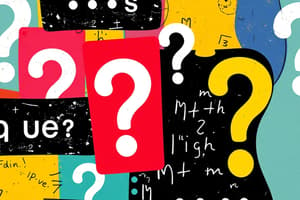Podcast
Questions and Answers
Explain the purpose of question tags in English.
Explain the purpose of question tags in English.
Question tags are used to express doubt or uncertainty at the end of statements.
How are question tags pronounced in British English?
How are question tags pronounced in British English?
In British English, question tags are often pronounced with a rising intonation.
Describe the grammatical status of question tags.
Describe the grammatical status of question tags.
Question tags are still considered declarative sentences.
What is the function of question tags in a sentence?
What is the function of question tags in a sentence?
How does the addition of a question tag change the sentence 'You want some tea'?
How does the addition of a question tag change the sentence 'You want some tea'?
What is the structure of question tags in English?
What is the structure of question tags in English?
In the sentence 'He isn't eating cheese,' what would be the corresponding question tag?
In the sentence 'He isn't eating cheese,' what would be the corresponding question tag?
If the main clause starts with an auxiliary verb, where does the subject pronoun go in the question tag structure?
If the main clause starts with an auxiliary verb, where does the subject pronoun go in the question tag structure?
Give an example of a question tag for the statement: 'Will he finish his project tomorrow?'
Give an example of a question tag for the statement: 'Will he finish his project tomorrow?'
How do question tags contribute to spoken English?
How do question tags contribute to spoken English?
Flashcards are hidden until you start studying
Study Notes
Question Tags
Question tags are used at the end of statements to make them into questions by adding an auxiliary verb such as 'do', 'did' or 'does'. This is also known as tagging. They express doubt or uncertainty. In British English, these question tags are often pronounced with a rising intonation, which can give them a questioning tone even if the statement itself doesn't sound like a question. Here's how they work:
Statement - Question Tag
-----------------------
I went to London last week - Did you?
She hasn't finished her homework yet - Has she?
They won't come tonight - Will they?
In Scottish English, question tags are more likely to be left alone after the statement, while in Northern Irish English, they may be pronounced with falling intonation or even omitted altogether. However, this does not affect their function, which remains the same regardless of regional variations.
Grammar
Grammatically, question tags are still considered declarative sentences because the first part of the sentence does not change from its original form. They merely express uncertainty rather than making a direct request for information. For example, "You want some tea?" is a request for information, while "You want some tea, don't you?" is a statement expressing doubt.
Word Order
The word order of question tags follows the structure: "Main clause + auxiliary verb + subject pronoun + question tag." So, for the sentence "He isn't eating cheese," the corresponding question tag would be "Isn't he?" or "Aren't you?" in response to someone else's statement. If the main clause starts with an auxiliary verb, the pronoun precedes it; otherwise, the pronoun follows the main clause.
For example:
Statement - Question Tag
-----------------------
Will he finish his project tomorrow? - Is he?
Has she been to Europe before? - Has she?
Would I need a visa to go there? - Wouldn't you?
Question tags offer a unique way to express doubt or uncertainty without changing the tense or meaning of the original statement. They provide a significant contribution to spoken English and are valuable tools when interacting with others.
Studying That Suits You
Use AI to generate personalized quizzes and flashcards to suit your learning preferences.




